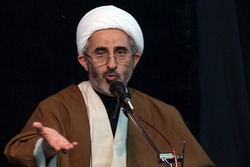 Rasa – Hujjat al-Islam Rostamnejad said, “Dozens of disciplines and fields of knowledge have been established in the seminary and one can claim that today, the seminaries have the most diverse system of disciplines in the Islamic educational system.”
Rasa – Hujjat al-Islam Rostamnejad said, “Dozens of disciplines and fields of knowledge have been established in the seminary and one can claim that today, the seminaries have the most diverse system of disciplines in the Islamic educational system.” RNA – Speaking at a conference entitled: “The Achievements of the Islamic Revolution, the Clergy and the Islamic Seminaries” which was held at the Centre for the Management of the Islamic Seminaries in Qom, Hujjat al-Islam Mahdi Rostamnejad, the deputy of education in the Islamic Seminaries of Iran, said, “The Islamic Seminaries are like a ‘good tree,’ of which its first cornerstone was laid by the Prophet of Islam and the Ahlul-Bayt.”
His Eminence said that almost fourteen centuries have passed in which the seminaries have reached perfection so that it could form a powerful government based on Wilayat al-Faqih [Guardianship of the Jurisprudent] and added, “It’s natural that before and after the Islamic Revolution that there have been many differences in many aspects, especially in terms of science and scientific achievements.”
He stated, “The first axis of the work of the seminaries is the development of the boundaries of knowledge and the diversification of specialized religious disciplines. These are among the most valuable works of the seminaries in the post-revolutionary period. The seminaries must enter into new realms and respond to the needs of the Islamic system and society.”
Hujjat al-Islam Rostamnejad added, “The seminaries that previously almost exclusively discussed jurisprudence and the principles of jurisprudence, after the Islamic Revolution, entered a new arena and today, dozens of disciplines and fields of knowledge have been established in the seminary and one can claim that today, the seminaries have the most diverse system of disciplines in the Islamic educational system.”
He explained that the second axis of the valuable work of the seminaries is their serious focus on new issues in jurisprudence and said, “The seminaries are seeking to solve the new jurisprudential issues required by the system and society, and after that, the glorious Islamic Revolution occurred and dozens of issues came to the fore in regard to which the seminaries must enter and give an appropriate response.”
Hujjat al-Islam Rostamnejad continued, noting, “In this regard, we can refer to the establishment of teaching chairmanships in the higher levels and kharij (graduate) level of dozens in new jurisprudential fields (medicine, education, social relations, politics and family), the design and implementation of dozens of disciplines in jurisprudence, the establishment of various scientific research centres on jurisprudence, the participation of seminarians in conferences on contemporary jurisprudence in Iran and abroad and the establishment of the Office of Studies and Research on Contemporary Jurisprudence in the seminaries.”
Rasa News Agency
112/975